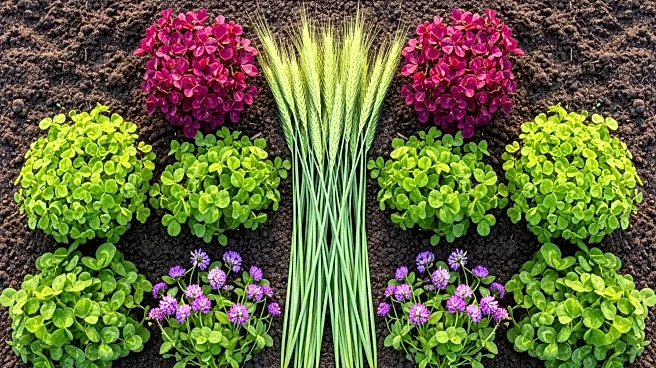What's Happening?
Modern Farmer has published an article detailing the benefits of various cover crops that are essential for maintaining soil health and boosting agricultural yields. Cover crops such as rye grass, buckwheat,
cereal rye, millet, mustard, oats, and field peas are highlighted for their ability to fix nitrogen, suppress weeds, and improve soil biodiversity. These crops are particularly beneficial in areas that are cultivated year after year, as they help reduce soil erosion and enhance overall soil health. The article emphasizes the importance of selecting the right cover crop based on regional climate and soil needs, and notes that some crops can also provide direct market value through their harvest.
Why It's Important?
The use of cover crops is crucial for sustainable agriculture, as they play a significant role in soil conservation and nutrient management. By improving soil health, these crops can lead to higher yields in subsequent planting seasons, benefiting farmers economically. Additionally, cover crops contribute to environmental sustainability by reducing the need for chemical fertilizers and pesticides, thus minimizing agricultural runoff and pollution. The article underscores the potential for cover crops to support biodiversity and pest control, which are vital for maintaining ecological balance in farming systems.
What's Next?
Farmers are encouraged to conduct soil tests and consider their specific regional conditions when selecting cover crops. As awareness of sustainable farming practices grows, there may be increased adoption of cover crops across various agricultural sectors. This could lead to further research and development in optimizing cover crop varieties for different climates and soil types. Additionally, market demand for crops like mustard and oats may rise as their benefits become more widely recognized.
Beyond the Headlines
The integration of cover crops into farming practices represents a shift towards more sustainable and environmentally friendly agriculture. This approach not only supports soil health but also aligns with broader efforts to combat climate change by reducing carbon emissions associated with traditional farming methods. The cultural shift towards sustainability in agriculture may also influence consumer preferences, driving demand for products grown using eco-friendly practices.









